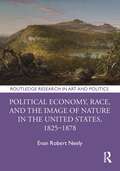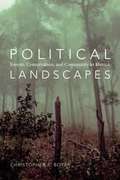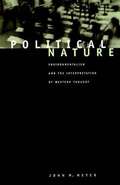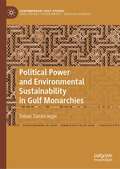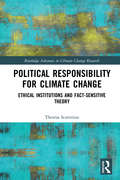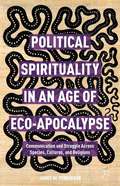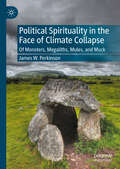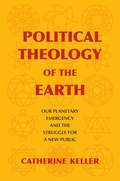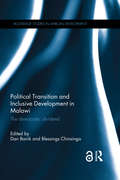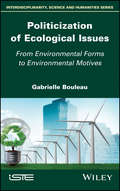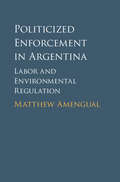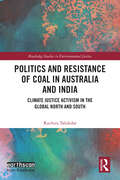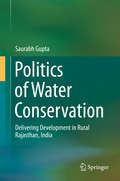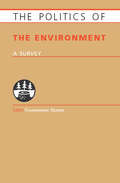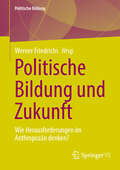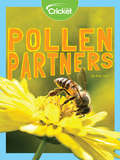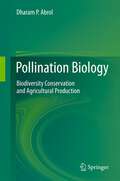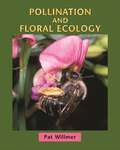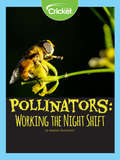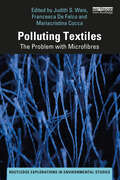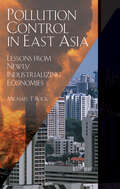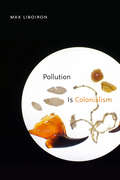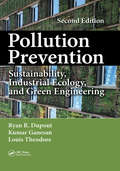- Table View
- List View
Political Economy, Race, and the Image of Nature in the United States, 1825–1878 (Routledge Research in Art and Politics)
by Evan Robert NeelyPolitical Economy, Race, and the Image of Nature in the United States, 1825–1878 is an interdisciplinary work analyzing the historical origins of a dominant concept of Nature in the culture of the United States during the period of its expansion across the continent.Chapters analyze the ways in which “Nature” became a discursive site where theories of race and belonging, adaptation and environment, and the uses of literary and pictorial representation were being renegotiated, forming the basis for an ideal of the human and the nonhuman world that is still with us. Through an interdisciplinary approach involving the fields of visual culture, political economy, histories of racial identity, and ecocritical studies, the book examines the work of seminal figures in a variety of literary and artistic disciplines and puts the visual culture of the United States at the center of intellectual trends that have enormous implications for contemporary cultural practice.The book will be of interest to scholars working in art history, visual culture, American studies, environmental studies/ecocriticism, critical race theory, and semiotics.
Political Landscapes: Forests, Conservation, and Community in Mexico
by Christopher R. BoyerFollowing the 1917 Mexican Revolution inhabitants of the states of Chihuahua and Michoacán received vast tracts of prime timberland as part of Mexico's land redistribution program. Although locals gained possession of the forests, the federal government retained management rights, which created conflict over subsequent decades among rural, often indigenous villages; government; and private timber companies about how best to manage the forests. Christopher R. Boyer examines this history in Political Landscapes, where he argues that the forests in Chihuahua and Michoacán became what he calls "political landscapes"--that is, geographies that become politicized by the interactions between opposing actors--through the effects of backroom deals, nepotism, and political negotiations. Understanding the historical dynamic of community forestry in Mexico is particularly critical for those interested in promoting community involvement in the use and conservation of forestlands around the world. Considering how rural and indigenous people have confronted, accepted, and modified the rationalizing projects of forest management foisted on them by a developmentalist state is crucial before community management is implemented elsewhere.
Political Nature: Environmentalism and the Interpretation of Western Thought
by John M. MeyerConcern over environmental problems is prompting us to reexamine established thinking about society and politics. The challenge is to find a way for the public concern for the environment to become more integral to social, economic, and political decision making.
Political Opportunities for Climate Policy
by Roger KarapinAnalysis of climate change policies focuses mainly on the prospects for international agreements or how climate policies should be designed. Yet effective domestic climate policies are essential to any global solution, and we know too little about how and why such policies are adopted. Political Opportunities for Climate Policy examines in depth the causes of effective climate policies in the United States, using a statistical analysis of all fifty states and long-term case studies of California, New York, and the federal government. Roger Karapin analyzes twenty-two episodes in which policies were adopted, blocked, or reversed. He shows that actors and events have positively affected climate policy making, despite the constraints presented by political institutions and powerful fossil fuel industries. Climate policy advocates have succeeded when they mobilized vigorously and astutely during windows of opportunity - which opened when events converged to raise both problem awareness and the political commitment to address them.
Political Power and Environmental Sustainability in Gulf Monarchies (Contemporary Gulf Studies)
by Tobias ZumbraegelThis book offers a new perspective about the Gulf Arab states entering a post-oil era by looking at the political factors behind the green transformation. It discusses the recent ‘environmental enthusiasm’ in the oil- and gas-rich Gulf monarchies by asking how political power can be constituted through advocating environmental sustainability. While hydrocarbon-wealthy Gulf monarchies have been viewed as the globe’s ‘hydrocarbon powerhouse’ with an immense ecological footprint, efforts towards sustainability and environmental protection measures are increasingly monitored. Climate Change, environmental, degradation and the global pressure towards a low-carbon development are threatening the very basis of economic and political power of the oil- and gas-exporting Gulf monarchies. So far, discussions about this fundamental transformation have barely elaborated how it affects and reorganizes political power games in the region. This book attempts to overcome the dominant focus of techno economic drivers of change and uncovers how environmental sustainability impacts state-society and state-elite relationships as well as shaping regional and even global geopolitics.
Political Responsibility for Climate Change: Ethical Institutions and Fact-Sensitive Theory (Routledge Advances in Climate Change Research)
by Theresa Birgitta ScaveniusThis book offers new perspectives on how social and political institutions can respond more effectively to climate change. Theresa Scavenius presents a concept of moral responsibility that does not address the obligations of individual citizens, but instead assesses the moral responsibility of institutionalised actors, such as governments, parliaments, and other governmental agencies. This focus on political responsibility is something that up until now has largely been neglected by moral theory, but Scavenius argues in this book that accountability must be assigned to institutionalised group agents. With this new research, she outlines building blocks for a new agenda of climate studies by offering an innovative approach to climate governance and democratic climate action at a time when many political initiatives have failed and crucially outlines the necessity of approaching moral dilemmas from a fact sensitive political theoretical approach. Written in a clear and engaging style, this volume will be an invaluable reference for researchers interested in moral philosophy, climate change, environmental politics and policy, and institutional theory.
Political Spirituality in an Age of Eco-Apocalypse
by James W. PerkinsonThis book 'hunts and gathers' across different historical epochs and situations, juxtaposing biblical materials and hip-hop, Christian colonialism and vodou, personal experience and racial politics, poetics and high theory. It is compelled by a desire to challenge the current crisis of sustainability from the point of view of indigenous communities and deep ancestry. Author James W. Perkinson ably synthesizes material from a diverse range of fields, including anarcho-primitivism, biblicalstudies, and history of religions in order to argue for a 'turn to indigeneity. ' The book's motive force is a deep concern for humanity's future in the face of eco-disasters like climate change and population overshoot as well as the compounding problems brought on by political economy calamities. Given the growing trend toward a turn away from institutionalized religious commitment and toward a more generalized and post-modern mix of practices and interests typically styled as 'spiritual,' the work proposes 'political spirituality' as a theme for investigation. Throughout the book, Perkinson raises the question: What does it really meant to be a human being? This query is posed not merely as a philosophical inquiry or existential musing, but as a personal and political conundrum arising from the overwhelming crises now engulfing our global reality. The book constitutes a poetic 'walk about' across quite different historical epochs and disparate contexts. Creatively foraging for indigenous memories and insurgent energies to help us live and cope in our modern state of unsustainability, the work aims to re-animate love of the wild and 'interspecies listening' for the sake of survival. The text articulates a deep suspicion toward our growing fascination with a kind of 'techno-messianism,' while nonetheless exploring some of the artistic innovations and meanings emerging from industrialization and digitalization.
Political Spirituality in the Face of Climate Collapse: Of Monsters, Megaliths, Mules, and Muck
by James W. PerkinsonThis book takes its motive force from our contemporary climate crisis. It seeks to reorient human (and especially Christian) understanding, towards a more ecologically-focused, indigenously-informed way-of-living. James W. Perkinson argues that our current eco-climatic and socio-political emergency is the culmination of a 5,000-year history of supremacist “settlement,” in which city-states first emergent in Mesopotamia and Egypt not only begin coercively organizing labor into surplus production and ecosystems into inordinate and destructive yields of “goods,” but in the process, also simultaneously “deform” the Spirit-World “haloing” of natural phenomenon into outsized service of imperial reach. Perkinson recognizes globalized humanity as an emerging monstrosity destroying both human culture and the world. How we re-envision and revalue, at our critical juncture, our inescapable interdependence with the more-than-human world as peer and teacher and even “elder,” is the central theme that throbs below the surface of the very disparate topics commanding attention in each chapter.
Political Theology of the Earth: Our Planetary Emergency and the Struggle for a New Public (Insurrections: Critical Studies in Religion, Politics, and Culture)
by Catherine KellerAmid melting glaciers, rising waters, and spreading droughts, Earth has ceased to tolerate our pretense of mastery over it. But how can we confront climate change when political crises keep exploding in the present? Noted ecotheologian and feminist philosopher of religion Catherine Keller reads the feedback loop of political and ecological depredation as secularized apocalypse. Carl Schmitt’s political theology of the sovereign exception sheds light on present ideological warfare; racial, ethnic, economic, and sexual conflict; and hubristic anthropocentrism. If the politics of exceptionalism are theological in origin, she asks, should we not enlist the world’s religious communities as part of the resistance?Keller calls for dissolving the opposition between the religious and the secular in favor of a broad planetary movement for social and ecological justice. When we are confronted by populist, authoritarian right wings founded on white male Christian supremacism, we can counter with a messianically charged, often unspoken theology of the now-moment, calling for a complex new public. Such a political theology of the earth activates the world’s entangled populations, joined in solidarity and committed to revolutionary solutions to the entwined crises of the Anthropocene.
Political Transition and Inclusive Development in Malawi: The democratic dividend (Routledge Studies in African Development)
by Dan Banik Blessings ChinsingaMalawi is among the few countries in sub-Saharan Africa that has witnessed significant improvements in relation to meeting the Millennium Development Goal (MDG) targets. It exhibits some of the main challenges facing African democracies while they attempt to consolidate the benefits of democratisation. Political Transition and Inclusive Development in Malawi critically analyses opportunities and constraints related to the impact of democracy on development in one of the world’s poorest countries. The book explores how, and to what extent, processes related to democratic and economic governance can be strengthened in order to make political and administrative authorities more responsive to development needs. It also considers characteristics of successful implementation of public policy and the effective and timely delivery of basic services in local contexts; increased citizen participation and dialogue with local government authorities; factors that enable civil society organisations to hold political and administrative officials to account; and better utilisation of academic research for improved evidence-based policy formulation and implementation. This volume will be of great interest to scholars in development studies, African studies, politics, law and anthropology, as well as policymakers and those interested in democracy, governance, human rights and the implementation of anti-poverty programmes, development administration and decentralisation.
Politicization of Ecological Issues: From Environmental Forms to Environmental Motives
by Gabrielle BouleauThe legitimacy of environmental policies is an issue of increasing concern for analysts. Ecological stakes are deemed to be global, but global public decisions are rare and implemented with difficulty. Dissensus prevails on environmental ethics and there is little evidence of any greening of policy tools. The global framing of the environment fails to account for how people relate to the ecological realities which surround them. Rather than placing the environment at a distance, Politicization of Ecological Issues advocates for building legitimacy from people’s perceptions of singular forms and patterns in their environment. Based on scholarly literature in political ecology and empirical cases of water policy in Europe, the book shows how the qualification of environmental realities has been politicized and translated into motives for public action. Similarly, it argues that theoretical debates addressing the ecological crisis are not only dealing with ideas, but rather advocating for specific environmental forms that are deemed to be motives of hope or worry.
Politicized Enforcement in Argentina
by Matthew AmengualCountries throughout the world have passed regulations that promise protection for workers and the environment, but violations of these policies are more common than compliance. All too often, limitations of state capacity and political will intertwine hindering enforcement. Why do states enforce regulations in some places, and in some industries, but not in others? In Politicized Enforcement in Argentina, Amengual develops a framework for analyzing enforcement in middle-income and developing countries, showing how informal linkages between state officials and groups within society allow officials to gain the operational resources and political support necessary for enforcement. This analysis builds on state-society approaches in comparative politics, but in contrast to theories that emphasize state autonomy, it focuses on key differences in the way states are porous to political influence.
Politics and Resistance of Coal in Australia and India: Climate Justice Activism in the Global North and South (Routledge Studies in Environmental Justice)
by Ruchira TalukdarSince 2009, international climate activism has focused on stopping coalmining in solidarity with local and Indigenous struggles that are resisting coalmining. Based on ethnographic and historic research in Australia and India, this book compares the politics and resistance to coal in the two countries, particularly focusing on the time period between 2009 and 2018, and the case of the Carmichael coalmine in Queensland and the Mahan coalmine in central India. This book shows differences and similarities in the political economy of coal and creates understanding about the significantly different imperatives and narratives of anti-coal environmentalism, in Australia and India. Through the Stop Adani movement and its collaboration with the Wangan and Jagalingou Traditional Owners and farmers against coalmining in Queensland, and Greenpeace and forest-based communities resisting coalmining in Madhya Pradesh, Ruchira Talukdar not only explores anti-coal movement dynamics but also how these movements grapple with the violation of Indigenous land rights through coal extraction, in both places. Drawing on differences and patterns in Australian and Indian anti-coal activisms, this book proposes a global outlook – an intersectional framework beyond the singularity of ‘stopping coal’ that can encapsulate visions for secure futures of communities on the frontlines of fossil fuel struggles – for climate activism. The conclusions help to decolonize climate activism as well as make it cognizant of global North-South contextual differences for effective solidarity.The author’s unique vantage point through experience in environmental activism over 20 years across Australia and India combined with research in both countries, makes this book a crucial resource for scholars and practitioners in just transition, climate politics and environmental activism across the global North and South.
Politics of Water Conservation
by Saurabh GuptaThis book examines the politics of rural development with special reference to watershed development interventions in the desert province of Rajasthan in India. Watershed development (and rainwater harvesting) is one of the most significant rural development interventions in rainfed areas of India since the early 1990s. A range of developmental actors including the state watershed department, international donors, NGOs and grassroots organisations are involved in sponsoring watershed development projects. Using multi-sited ethnography and conversational interviews with the deliverers as well as recipients of development, the book compares and contrasts the watershed interventions of the state and two different kinds of NGOs in Rajasthan. While conventional studies on watershed development have focused on the evaluation of 'success' or 'failure' of particular projects, whether implemented by the state or NGOs, the book moves beyond this narrow analytical gaze to look at the roles, agendas and interests of multiple development agencies, often partnering together and sometimes competing with each other as part of, what the author calls, the 'watershed development regime'. Taking cue from watershed development and water conservation projects over the last two decades, the book engages with the larger question of 'how' of delivering development. It examines the complex processes of cooperation, competition, negotiations, contestations and conflicts between different stakeholders, including the agents of development and differently positioned rural social groups in the context of Rajasthan. The book demonstrates that the recent interventions in watershed development and rainwater harvesting have considerably shaped the politics of development in Rajasthan in a number of ways: by becoming a site for the remaking of the 'state' and its internal relations, by disturbing the local hegemony in the countryside, by creating new relations of patronage between diverse agents and recipients of development, by increasing the associational capacity as well as creating new conflicts (intra and inter village) and by initiating competition and cooperation between the various agents of development over control of local resources and power.
Politics of the Environment: A Survey
by Chukwumerije OkerekeThe environment is increasingly seen at the forefront of many political agendas. Covering important topics, such as the Kyoto protocol and deforestation, this book provides extensive coverage of all aspects of environmental politics. Essays of around 6,000 words in length make up the bulk of the book. Written by notable experts in the field of environmental politics, these essays each examine a different aspect of the subject.
Politische Bildung und Zukunft: Wie Herausforderungen im Anthropozän denken? (Politische Bildung)
by Werner FriedrichsPolitische Bildung bezieht ihren Sinngehalt u. a. aus der Idee einer gelingenden Begegnung mit dem Zukünftigen. Im 3. Jahrtausend muss sie sich allerdings – jenseits der Alternative zwischen einer unausweichlichen, düsteren Katastrophe und einem naiven Machbarkeitsoptimismus – der Frage nach der (un)möglichen Gestaltbarkeit der Zukunft stellen. Denn im Anthropozän wird die Zukunft zunehmend brüchig. Das wirft Fragen von zentraler Bedeutung auf. Wie kann sich die politische Bildung zukünftig auf das Zukünftige beziehen? Welche Themen und Fragen werden zukünftig wichtig sein? Welche didaktischen Methoden und Prinzipien sind zukünftig noch tragfähig? In den Beiträgen wird mit unterschiedlichen Schwerpunkten nach Antworten gesucht.
Politischer Wandel in der bundesdeutschen Kernenergiepolitik von 1975 bis 1997: Eine Multiple Streams Analyse
by Christian von FalkenhausenIm Frühjahr 2023 gingen in der Bundesrepublik Deutschland die letzten Kernkraftwerke vom Netz. Es war das politisch beschlossene Ende einer Technologie, die vor rund 50 Jahren noch als unumstrittene Zukunftshoffnung zur Sicherung von Wachstum und Wohlstand gegolten hatte und dann als Gegenstand der Kernenergiekontroverse eine ganze Generation begleitet und teilweise sogar nachhaltig geprägt hatte. Christian von Falkenhausen unternimmt in diesem Buch den Versuch, anhand einer Multiple Streams Analyse der politischen Prozesse der Jahre 1975 bis 1997 zu zeigen, dass die Grundlagen für die späteren politischen Atomausstiege in dieser Frühphase gelegt wurden.
Pollen Partners
by Amy TaoDo you know how new flowers are made? It’s a process called pollination, which is what happens when pollen is moved from one flower to another! The flowers rely on animals like bees and hummingbirds to do this for them, and in return, they offer the animals delicious nectar to eat. What is your favorite pollen-moving animal?
Pollination Biology
by Dharam P. AbrolThis book has a wider approach not strictly focused on crop production compared to other books that are strictly oriented towards bees, but has a generalist approach to pollination biology. It also highlights relationships between introduced and wild pollinators and consequences of such introductions on communities of wild pollinating insects. The chapters on biochemical basis of plant-pollination interaction, pollination energetics, climate change and pollinators and pollinators as bioindicators of ecosystem functioning provide a base for future insights into pollination biology. The role of honeybees and wild bees on crop pollination, value of bee pollination, planned honeybee pollination, non-bee pollinators, safety of pollinators, pollination in cages, pollination for hybrid seed production, the problem of diseases, genetically modified plants and bees, the role of bees in improving food security and livelihoods, capacity building and awareness for pollinators are also discussed.
Pollination and Floral Ecology
by Pat WillmerPollination and Floral Ecology is the most comprehensive single-volume reference to all aspects of pollination biology--and the first fully up-to-date resource of its kind to appear in decades. This beautifully illustrated book describes how flowers use colors, shapes, and scents to advertise themselves; how they offer pollen and nectar as rewards; and how they share complex interactions with beetles, birds, bats, bees, and other creatures. The ecology of these interactions is covered in depth, including the timing and patterning of flowering, competition among flowering plants to attract certain visitors and deter others, and the many ways plants and animals can cheat each other. Pollination and Floral Ecology pays special attention to the prevalence of specialization and generalization in animal-flower interactions, and examines how a lack of distinction between casual visitors and true pollinators can produce misleading conclusions about flower evolution and animal-flower mutualism. This one-of-a-kind reference also gives insights into the vital pollination services that animals provide to crops and native flora, and sets these issues in the context of today's global pollination crisis. Provides the most up-to-date resource on pollination and floral ecology Describes flower advertising features and rewards, foraging and learning by flower-visiting animals, behaviors of generalist and specialist pollinators--and more Examines the ecology and evolution of animal-flower interactions, from the molecular to macroevolutionary scale Features hundreds of color and black-and-white illustrations
Pollinators: Working the Night Shift
by Stephen BuchmannBees, moths, birds, and bats are all pollinators. But what are they actually doing? Why do flowers make pollen and why do they need it? Readers will discover that without pollinators, we wouldn't have fruit or vegetables to eat, so it's up to us to protect these vital animals.
Polluting Textiles: The Problem with Microfibres (Routledge Explorations in Environmental Studies)
by Judith S. Weis Mariacristina Cocca Francesca De FalcoThis book examines the critical issue of environmental pollutants produced by the textiles industry. Comprised of contributions from environmental scientists and materials and textiles scientists, this edited volume addresses the environmental impact of microplastics, with a particular focus on microfibres released by textiles into marine and water environments. The chapters in Part I offer environmental perspectives focusing on the measurement of microplastics in the environment, their ingestion by small plankton and larger filter feeders, the effects of consuming microplastics, and the role of microplastics as a vector for transferring toxic contaminants in food webs. Written by environmental and material scientists, the chapters in Part II present potential solutions to the problem of microplastics released from textiles, discussing parameters of influence, water treatment, degradation in marine environment, textile end-of-life management, textile manufacturing and laundry, possible policy measures. This is a much needed volume which brings together in one place environmental research with technical solutions in order to provide a cohesive and practical approach to mitigating and preventing environmental pollution from the textiles industry going forward. This book will be of great interest to students and scholars of environmental conservation and management, environmental pollution and environmental chemistry and toxicology, sustainability, as well as students and scholars of material and textiles science, textile engineering and sustainable manufacturing.
Pollution Control in East Asia: Lessons from Newly Industrializing Economies (Environmental Development Ser. #No. 9)
by Michael T. RockWhy do some economies seem to excel at effective pollution management while others miss the mark when responding to deteriorating urban environments? These studies of pollution management in East Asia's newly industrialized economies (NIEs) include successful government responses in Singapore and Taiwan, qualified results in China and Indonesia, and much more limited success in Thailand and Malaysia. In each example, Michael Rock considers the starting point of the economy as it began its path toward industrialization in the post World War II period. He discusses the relevant historical and political context, the pressures placed on the political system from domestic and international sources, and the influence of ongoing trends in East Asia for democratization and economic liberalization. Rock's text makes it clear that each economy found unique, innovative ways to link environmental protection to its own political and economic institutions. Thus, while public pressure from both home and abroad gave strong impetus to successful programs in Taiwan, the development of policy in Singapore involved limited public review and a centralized, government-led process. The result of Rock's scholarship is a book that provides important lessons without being reductionist. The book offers insights to apply to pollution management in a diverse range of developing nations, but avoids attempts for precise prescriptions, or universally appealing, normative answers. A copublication of Resources for the Future and the Institute of Southeast Asian Studies (ISEAS).
Pollution Is Colonialism
by Max LiboironIn Pollution Is Colonialism Max Liboiron presents a framework for understanding scientific research methods as practices that can align with or against colonialism. They point out that even when researchers are working toward benevolent goals, environmental science and activism are often premised on a colonial worldview and access to land. Focusing on plastic pollution, the book models an anticolonial scientific practice aligned with Indigenous, particularly Métis, concepts of land, ethics, and relations. Liboiron draws on their work in the Civic Laboratory for Environmental Action Research (CLEAR)—an anticolonial science laboratory in Newfoundland, Canada—to illuminate how pollution is not a symptom of capitalism but a violent enactment of colonial land relations that claim access to Indigenous land. Liboiron's creative, lively, and passionate text refuses theories of pollution that make Indigenous land available for settler and colonial goals. In this way, their methodology demonstrates that anticolonial science is not only possible but is currently being practiced in ways that enact more ethical modes of being in the world.
Pollution Prevention: Sustainability, Industrial Ecology, and Green Engineering, Second Edition
by Louis Theodore Kumar Ganesan Ryan DupontThis new edition has been revised throughout, and adds several sections, including: lean manufacturing and design for the environment, low impact development and green infrastructure, green science and engineering, and sustainability. It presents strategies to reduce waste from the source of materials development through to recycling, and examines the basic concepts of the physical, chemical, and biological properties of different pollutants. It includes case studies from several industries, such as pharmaceuticals, pesticides, metals, electronics, petrochemicals, refineries, and more. It also addresses the economic considerations for each pollution prevention approach.
